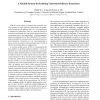26 search results - page 1 / 6 » Lightweight Flexible Isolation for Language-based Extensible... |
109
click to vote
VLDB
2002
ACM
15 years 1 months ago
2002
ACM
Safe programming languages encourage the development of dynamically extensible systems, such as extensible Web servers and mobile agent platforms. Although protection is of utmost...
108
click to vote
OSDI
1996
ACM
15 years 2 months ago
1996
ACM
Today's extensible operating systems allow applications to modify kernel behavior by providing mechanisms for application code to run in the kernel address space. The advanta...
107
click to vote
ACSAC
2006
IEEE
15 years 7 months ago
2006
IEEE
With the recent advent of dynamically extensible software systems, in which software extensions may be dynamically loaded into the address space of a core application to augment i...
106
click to vote
CL
2010
Springer
15 years 1 months ago
2010
Springer
In a modern programming language, scoping rules determine the visibility of names in various regions of a program [15]. In this work, we examine the idea of allowing an applicatio...
110
click to vote
USENIX
2008
15 years 3 months ago
2008
Code sandboxing is useful for many purposes, but most sandboxing techniques require kernel modifications, do not completely isolate guest code, or incur substantial performance co...

